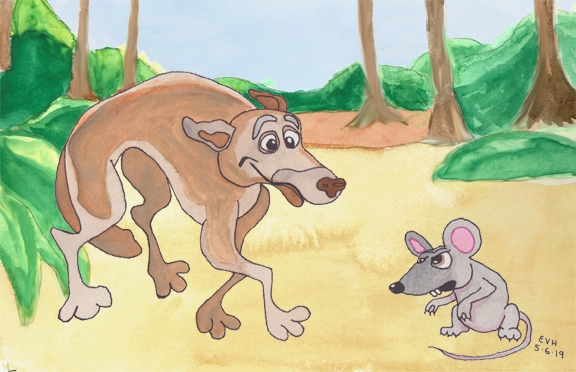
Jataka 128
Biḷāra Jātaka
The Cat-like Nature
as told by Eric Van Horn
originally translated by Robert Chalmers, B.A., of Oriel College, Oxford University
originally edited by Professor Edward Byles Cowell, Cambridge University
It never ceases to amaze me how many of these stories are about misbehaving monks. When the Buddha first started to teach his Dharma, there was no monastic code. This was because all of his students were very dedicated and did not need rules to keep them in line. But as the Saṇgha grew, the quality of the monastics naturally went down. This is why we ended up with so many rules for the monks and nuns. This phenomenon is why some later schools of Buddhism – like today’s Thai Forest Tradition – never tried to recruit large numbers. They were content to settle for quality over quantity.
“Where saintliness.” This story was told by the Master while he was at Jetavana. It is about a hypocrite. When the monk’s hypocrisy was reported to him, the Master said, “This is not the first time he has shown himself to be a hypocrite. He was the same in times gone by.” So saying he told this story of the past.
Once upon a time when Brahmadatta was reigning in Benares, the Bodhisatta was born as a rat. He was perfect in wisdom and as big as a young boar.
He lived in the forest and many hundreds of other rats lived under his rule.
Now there was a roving jackal who saw this troop of rats and tried to come up with a way to trick and eat them. He positioned himself near their home with his face to the sun, with his mouth open to the wind, and standing on one leg. The Bodhisatta saw this when he was out on the road in search of food. He thought the jackal must be a saintly being. He went up to him and asked his name.
“’Godly’ is my name,” the jackal said.
“Why do you stand on one leg?”
“Because if I stood on all four legs at once, the earth could not bear my weight. That is why I stand on one leg only.”
“And why do you keep your mouth open?”
“To take the air. I live on air. It is my only food.”
“And why do you face the sun?”
“To worship it.”
“What virtue!” the Bodhisatta thought. Thereafter he made a point of going along with the other rats to pay his respects every morning and every evening to the saintly jackal. But when the rats were leaving, the jackal seized and devoured the last one to leave. He wiped his lips and acted as though nothing had happened.
Because of this the rats grew fewer and fewer in number, until they noticed the gaps in their ranks. They wondered why this was so, and they asked the Bodhisatta the reason this was happening. He could not figure it out. But he suspected the jackal and determined to put him to the test. So on the next day he let the other rats go out first and he brought up the rear. The jackal sprang on the Bodhisatta who saw him coming. He turned around and cried, “So this is your saintliness, you hypocrite and rascal!” And he repeated the following stanza:
Where saintliness is but a cloak
Whereby to trick innocent folk
And hide a villain’s treachery,
The cat-like nature there we see.
(Although the story is about a jackal, for some reason the stanza refers to a cat. This story also appears in the great Indian epic, the Mahābhārata. The Mahābhārata version also references a cat.)

Figure: The Rat Discovers a Rat!
So saying, the king of the rats jumped at the jackal’s throat and bit his neck just below the jaw so that he died. The other rats came back and gobbled up the body of the jackal with a “crunch, crunch, crunch.” That is to say, the first ones to get there did, for they say there was nothing left for those who arrived last. And after that the rats lived happily in peace and quiet.
His lesson ended, the Master made the connection by saying, “This hypocritical monk was the jackal of those days, and I was the king of the rats.”
